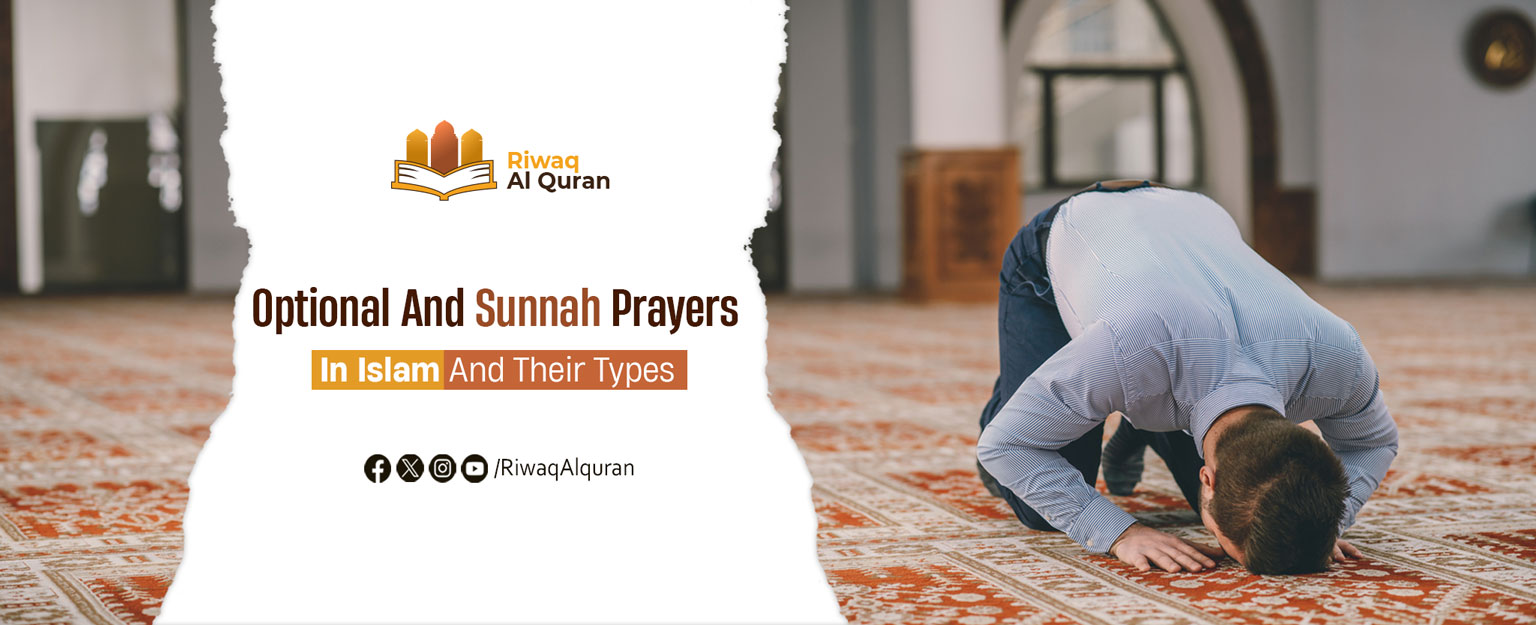Optional and sunnah prayers in Islam, such as Nafl prayers, offer additional opportunities for spiritual devotion beyond the obligatory five daily prayers, encouraging believers to draw closer to Allah and earn extra rewards.
Emphasizing consistency, the Prophet Muhammad (peace be upon him) advocated for regular engagement in these voluntary acts of worship, underscoring the significance of persistent yet small deeds in Islam.
These prayers encompass various types, including the Sunnah of Wudu, the Dhuha prayer, Qiyam prayer, and Janazah prayer, each serving as a means for believers to deepen their spiritual connection and reinforce their bond with their Creator.
The Obligatory daily prayers are the pillar and backbone of Islam. It’s the key that solidifies the Muslim’s connection with Allah almighty on a daily basis. But beyond the obligation lies the hidden treasures of voluntary worship.
The optional voluntary prayers in Islam are for those who seek to get even closer to Allah and want to ascend to higher levels of rewards. Today we will explore the optional prayers in Islam that can get us closer and closer to Allah almighty.
Table of Contents
Optional prayers in Islam
Optional prayers are prayers a Muslim can do for additional rewards or benefits. They are not obligatory like the five daily prayers.
Optional prayers are means for those who want to get closer to God almighty
Allah (Glorified is He) says in Hadith narrated by prophet Muhammad peace be upon him: “and My slave keeps on coming closer to Me through performing Nawafil (optional prayers) till I love him” Sahil Bukhari:6502
It’s recommended to be consistent and make the optional prayer a habit if you choose to do it, even if it’s small
The prophet peace be upon him said: “The most beloved deeds by Allah are the most consistent, even if it’s little.” Sahih Bukhari:6465
So, praying an additional Two Rakat a day, every day, is better for you than praying the 12 Rakat after prayers for only a few days.
Nafl prayers, also known as voluntary prayers, offer Muslims additional opportunities for spiritual devotion beyond the obligatory five daily prayers. These supplementary prayers serve as a means to strengthen one’s connection with Allah and earn additional rewards. Understanding and incorporating Nafl prayers into one’s daily routine can enrich the spiritual experience and deepen the bond with the Creator.
There is a total of 12 Nafl prayer Rakat in the day:
1. Two Rakat Before Fajr
Offering two Rakat of Nafl prayer before the break of dawn serves as a voluntary act of devotion to commence the day. This additional prayer before the Fajr prayer allows believers to start their day with spiritual preparation and supplication, seeking closeness to Allah and setting a positive tone for the day ahead.
2. Two to Four Rakat Before Dhuhr (after Adhan of Dhuhr)
Following the call to prayer (Adhan) for the Dhuhr prayer, it is recommended to perform two to four Rakat of Nafl prayer. These voluntary prayers offer an opportunity for further spiritual engagement and reflection before engaging in the obligatory midday prayer, enhancing one’s connection with Allah and fostering a sense of tranquility and mindfulness.
3. Two Rakat After Dhuhr
After completing the obligatory Dhuhr prayer, believers can engage in an additional two Rakat of Nafl prayer. This voluntary act of worship allows for continued spiritual devotion and reflection, deepening one’s connection with Allah and expressing gratitude for the opportunity to engage in prayer.
4. Two Rakat After Maghrib
Following the Maghrib prayer, believers have the opportunity to perform two Rakat of Nafl prayer. These voluntary prayers serve as a gesture of gratitude for the blessings of the day and provide a moment for further spiritual reflection and connection with Allah before the evening comes to a close.
5. Two Rakat After Isha
Before retiring for the night, believers can engage in two Rakat of Nafl prayer after completing the Isha prayer. These voluntary prayers offer an opportunity for spiritual reflection and connection with Allah, allowing believers to conclude their day with mindfulness and devotion, seeking peace and tranquility in the presence of the Creator.
Note that in the Sunnah prayers that are before, you should pray those between Adhan and Iqamah of the main Salah. And pray the ones after shortly if possible.
6. Praying After Wudu
It is good to pray a short two Rakat after making wudu, even if it isn’t time for any major Salah.
This small deed falls under the saying of the prophet peace be upon him: “The Most beloved deeds to Allah, are the most consistent even if small” Sahih bukhari:6465
This prayer was a habit of Bilal (May Allah be pleased with him) the companion of the prophet peace be upon him –He told Bilal that he heard his footsteps in Jannah, so what deed he thinks got him there? He answered: “I always renew my wudu whenever it’s broken, and whenever I make wudu I pray” riyadussalihin:1146
Also, the prophet peace be upon him said: “Whoever made wudu like mine then prayed two Rakat, not speaking to himself in them, Allah will surely forgive for him whatever was passed from his sins.” Sahih bukhari:1934
Such a great reward for such a small deed –Indeed, Allah is the most generous of All!
7. Dhuha Prayer
Dhuha prayer is the prayer you can pray after sunrise and before noon.
The prophet peace be upon him called it: “The Dhuha Prayer is the prayer of the (Awabin)” Sahih Muslim (Awab) is a name who turns back to Allah, repents, and sticks to his repentance.
Also, He said: “In the morning, alms are due for him, ever fast is alms, every pilgrimage is alms, every utterance of “Glory to be Allah” is alms, every utterance of “Allah is most great” is alms, every utterance of “Praise be to Allah” is alms. The Messenger of Allah (ﷺ) recounted all such good works. He then said: Two rak’ahs which one prays in the Duha serve instead of that.” Sahih Abu Dawood
There are plenty of benefits and rewards for praying Duha as mentioned in Sunnah. Praying Duha is simple and easy, so make sure not to miss on such rewards.
8. Qiyam Prayer
Qiyam Prayer or Qiyam Al-layl is the prayer for the night after Isha and before Fajr.
Qiyam was originally obligatory before the daily prayers and was one of the first things to be ordered of Muslims in Makkah. Read from Surah Al-Muzzammil
Qiyam has a great benefit while it’s usually done in private, making it only between you and Allah. Especially, if you pray it in the last third of the night, when everyone else is usually asleep!
This helps a lot in awakening the heart, filling it with sincerity and remembrance of Allah (Glorified is He)
Qiyam prayer is usually done with a long recitation of the Quran if possible (many scholars say that in optional prayers you can read from Mushaf)
Learn How to read Quran from native Arabic speaker
Finally, Qiyam is special because it’s the prayer where you can say a lot of Dua in Sujud, especially Istigfar. Allah is listening to you, so ask Him for all you want in this life and the next, and ask His forgiveness!
10. Janazah Prayer
Janazah is the prayer done for the dead Muslim before he is buried. Its purpose is to plead for Allah on his behalf to make it easy for him in such a transition.
Praying Janazah isn’t a fully optional prayer, it’s called (Fard Kifayah).
Fard Kifayah is obligatory but not for everyone. If some Muslims did it, then the rest don’t have to, but if no one did it, everyone carries a sin!
The prophet peace be upon him said: “Whoever prays on Janazah will have a (Qirat) of reward, and then whoever follows it until it’s buried will have two (Qirat). Then he explained that a Qirat is like Mount Uhud! ” Sahih muslim:945d
Janazah prayer is a manifestation of the Islamic brotherhood, where the community doesn’t leave behind the Muslim in his hardest time.
Death is indeed a necessity that all of us will face, Janazah is a reminder of that.
Experience Riwaq Al Quran Classes
Watch real moments from our live sessions at Riwaq Al Quran and see how we bring learning to life. These clips highlight our interactive, student-focused approach designed to keep learners engaged, motivated, and actively involved in every step of their educational journey.
Why Students Love Learning with Riwaq Al Quran
Hear directly from our students about how Riwaq Al Quran Academy has transformed their connection with the Book of Allah. Their experiences reflect the dedication, care, and quality that guide every step of our teaching.
Learn Quran, Arabic And Islamic Studies Online With The Best Native Tutors
Riwaq Al Quran is a comprehensive online platform that offers personalized Quran, Arabic and Islamic Studies Online classes for individuals of all ages and backgrounds.
Their experienced instructors use a structured curriculum to cover Tajweed, Tafsir, and Memorization, providing easy and effective access to learning the Quran.
The advanced online classes allow for seamless communication and interaction between students and teachers. Join Riwaq Al Quran for a deeper connection with the Quran.
We offer several courses such as:
- Online courses for kids.
- Online Quran classes for kids and adults.
- Online Arabic courses
- Online Ijazah courses
- Online Islamic Studies courses.
Here are a sample of our set of Quran Courses that will be helpful for you:
- Online Tafseer Course: Delve into Quranic meanings with our insightful online Tafseer course.
- Noorani Qaida Online: Learn Quranic basics efficiently through our Noorani Qaida online program.
- Online Quran Recitation Course: Enhance Quranic recitation skills through our expert-led online course.
- Online Tajweed Classes: Master Tajweed rules for beautiful Quranic recitation in online classes.
- Quran Memorization Online Course: Memorize the Quran effectively with our specialized online memorization course.
- Online Qirat Course: Explore diverse Qirat styles with our comprehensive online Qirat course.
- Online Quran Classes for Kids: Nurture a love for the Quran in kids through interactive online classes.


Conclusion:
In Islam, various types of voluntary prayers exist, each offering unique avenues for spiritual growth and connection with Allah. These include the Sunnah of Wudu, performed after ablution, and the Dhuha prayer, observed after sunrise as a symbol of devotion and repentance.
Qiyam prayer, or Qiyam Al-layl, allows for intimate communion with Allah during the night, fostering sincerity and reflection. Additionally, Janazah prayer, though obligatory as a communal duty, serves as a reminder of life’s fleeting nature and the significance of communal support during times of loss. Engaging in these voluntary prayers enriches one’s spiritual journey, reinforcing the bond between the believer and their Creator.
Optional prayers, or Nafl prayers, provide Muslims with additional opportunities for spiritual devotion beyond the obligatory five daily prayers. These prayers are not mandatory but offer a means for believers to draw closer to Allah and earn extra rewards. Emphasizing consistency, the Prophet Muhammad (peace be upon him) encouraged regular engagement in these voluntary acts of worship, highlighting the importance of small yet persistent deeds in Islam.


































